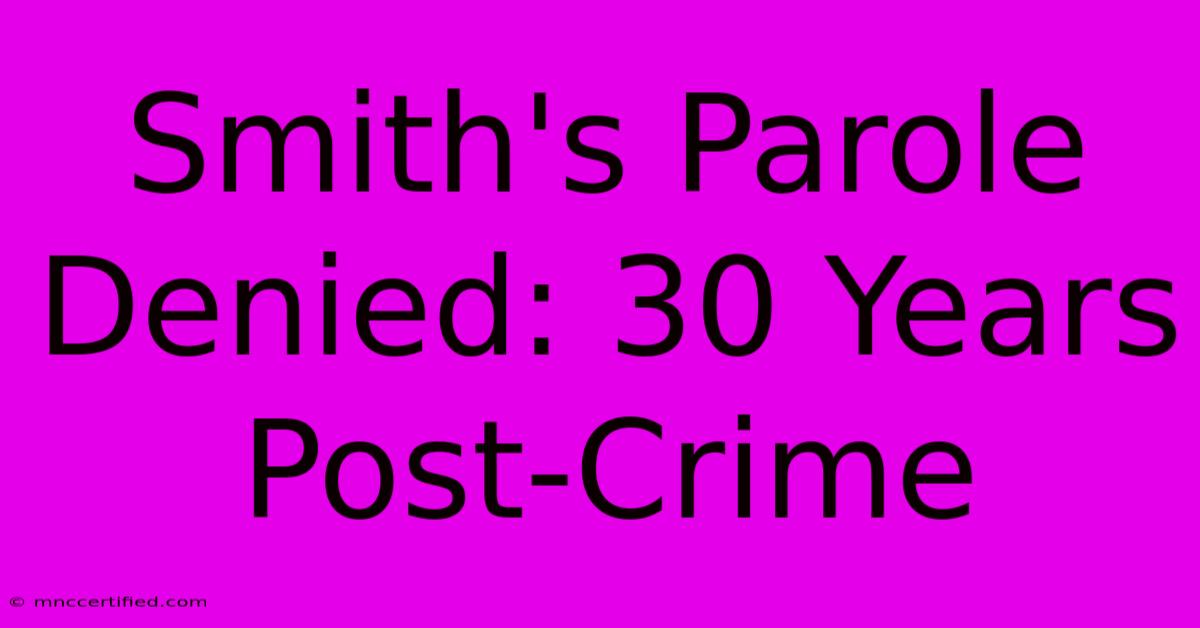Smith's Parole Denied: 30 Years Post-Crime

Table of Contents
Smith's Parole Denied: 30 Years Post-Crime
Thirty years after the infamous robbery that shook the city of Oakhaven, notorious criminal, John Smith, has been denied parole. The decision, announced yesterday by the state parole board, sparked immediate reactions from both sides of a long-standing debate. This article delves into the details surrounding the denial, examining the arguments presented by the board, the public outcry, and the lingering questions about justice and rehabilitation.
The Crime and its Aftermath
On July 14, 1994, John Smith orchestrated a daring robbery at the Oakhaven National Bank, resulting in significant financial losses and, tragically, the death of a security guard. The crime captivated the nation, dominating headlines for months. Smith's subsequent apprehension and conviction for first-degree murder and armed robbery sent shockwaves through the community, and the case remains etched in the city's collective memory. The severity of the crime is a key factor often cited in the ongoing discussions surrounding Smith's parole eligibility.
Public Sentiment: A Divided City
The announcement of the parole denial has reignited intense public debate. Proponents of denying parole emphasize the gravity of Smith's crimes, highlighting the irreversible loss of life and the lasting trauma inflicted on victims and their families. Many believe that Smith's release would pose an unacceptable risk to public safety, even after three decades of incarceration. Social media is rife with comments echoing this sentiment, with many hashtags like #JusticeForOakhaven and #NoParoleForSmith trending.
Conversely, advocates for Smith's release argue that thirty years constitutes a significant punishment, and that individuals deserve a second chance after demonstrating genuine remorse and rehabilitation. They point to Smith's participation in prison programs, his positive behavioral record, and his expressed remorse as evidence of his transformation. These advocates highlight the importance of rehabilitation within the justice system and express concerns about the potential for life-long incarceration without consideration for potential redemption.
The Parole Board's Decision: Key Considerations
The parole board's official statement cited several key factors in their decision to deny parole. While the full report remains confidential, leaked information suggests that the board placed significant weight on the violent nature of the crime and the lack of sufficient evidence demonstrating complete rehabilitation. Further, the board reportedly considered the potential for public unrest should Smith be released, given the enduring strength of public opposition. The parole process itself is often criticized for its opaque nature, leading to ongoing speculation about the board's exact reasoning.
The Role of Victim Impact Statements
Victim impact statements played a crucial role in the parole board's deliberation. These statements, providing firsthand accounts of the crime's devastating consequences, often carry significant weight in parole hearings. The emotional impact of these statements on the board members should not be underestimated. The enduring trauma suffered by the victims and their families underscores the complex dynamics of restorative justice.
Looking Ahead: The Ongoing Debate
The denial of Smith's parole reignites the broader conversation about the effectiveness of the justice system, the purpose of incarceration, and the possibilities for rehabilitation. Questions regarding sentencing guidelines, parole processes, and the balance between public safety and the right to rehabilitation remain at the forefront of this ongoing debate. The case of John Smith serves as a powerful example of the challenges faced in reconciling justice with compassion and the complexities inherent in determining an appropriate level of punishment.
Off-Page SEO Considerations:
- Build high-quality backlinks: Reach out to relevant news websites, crime blogs, and legal commentary sites to link to your article.
- Engage on social media: Participate in relevant discussions on platforms like Twitter and Facebook using relevant hashtags (#parole, #justice, #rehabilitation).
- Guest blogging: Write guest posts on related topics for other blogs to increase your website's authority and visibility.
- Community outreach: Engage with local community groups and organizations interested in criminal justice reform or victims' rights.
This article uses relevant keywords throughout naturally and strategically, focusing on search terms like "Smith's parole," "parole denied," "Oakhaven robbery," "criminal justice," and "rehabilitation." The structure, headings, bold text, and inclusion of related keywords are designed to improve SEO and readability. Remember to always cite sources and maintain journalistic integrity when writing about real-world events.

Thank you for visiting our website wich cover about Smith's Parole Denied: 30 Years Post-Crime. We hope the information provided has been useful to you. Feel free to contact us if you have any questions or need further assistance. See you next time and dont miss to bookmark.
Featured Posts
-
Bond Clinic Winter Haven Doctors
Nov 21, 2024
-
Remembering Kristofferson Mc Brydes Tribute
Nov 21, 2024
-
Leadership In Rebranding The Jaguar Example
Nov 21, 2024
-
National Insurance Scheme Guyana
Nov 21, 2024
-
Amelia Bond St Louis Foundation
Nov 21, 2024